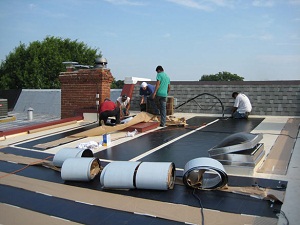D.C. Co-op helping residents go solar in nation’s capital
 Washington, D.C., residents are going solar thanks to the efforts of local solar cooperatives, which have come together to form DC SUN (DC Solar United Neighborhoods). The organizations are now working together to help more people go solar and getting incentive programs in place to make solar more attractive in the nation’s capital.
Washington, D.C., residents are going solar thanks to the efforts of local solar cooperatives, which have come together to form DC SUN (DC Solar United Neighborhoods). The organizations are now working together to help more people go solar and getting incentive programs in place to make solar more attractive in the nation’s capital.
One of the tricky things about installing solar energy in a historic area like Washington, D.C., is complying with historic-building laws. For instance, homes in Mount Pleasant are mainly brick row houses, some of which were built in the early 1800s. Local laws prohibit the homes from having visible solar installations, so the Co-ops work with installers to assure that system designs are not visible from the street.
The Mount Pleasant Solar Cooperative has helped homeowners in the neighborhood go solar through informing them about solar incentives and rebates.
“About 75 houses and counting,” said Mount Pleasant Co-op co-founder and President Anya Schoolman. “We have preferred installers that we recommend to our members. We take no money out of the deal—so our members trust us to be neutral advisers. Installers know our members are well organized, highly connected to other past and future customers and serious potential clients, so they compete very heavily and give us very good prices.”
In the larger, regional picture, DC SUN is working to make sure the incentives to install solar in the region are improved.
“We have Co-ops all over the city. Right now, we are focused on advocacy—getting incentives passed, forcing the utility to provide net meters and net meter billing in a timely fashion,” Schoolman said. “We are also focused on expanding the solar market to low income [homeowners], small businesses and non-profits. The market is very new here. We are more focused on building the market conditions at the moment.”
DC SUN also is working to make sure that new installers can become preferred installers, Schoolman said.
“We try to keep the market open and flexible so that, as new installers open businesses in DC, we can be open to letting new companies grow and expand,” Schoolman said. “We are as concerned about jobs and the economy of our local communities as we are about solar—so we try to maximize both.”
There’s also a larger effort brewing, Schoolman said: the Community Power Network, which already has roughly 250 member organizations across the country.
“We include a whole range of community renewables in our network,” Schoolman said. “Solar gardens, Community-owned wind or solar, solar raisers—like do it yourself barn raising—solar cooperatives, community owned LLCs and so forth.”
Image courtesy of Mount Pleasant Solar Cooperative.



